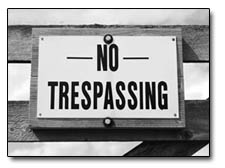
Changes in the landscape
At the time, it felt like a cruel joke.
Rachael, the baby and I had been bumping around on one
of our favorite local trails. Our footfalls crossed sandstone
ledges, heads ducked beneath pinon  and
ponderosa, and eyes looked out over the Animas Valley.
After a series of steep twists and drops, the familiar
trail came to an end, rejoining another stem. But there
it was, staring boldly at us in orange on black. “Private
Property,” the sign read. “Violators will
be prosecuted.” and
ponderosa, and eyes looked out over the Animas Valley.
After a series of steep twists and drops, the familiar
trail came to an end, rejoining another stem. But there
it was, staring boldly at us in orange on black. “Private
Property,” the sign read. “Violators will
be prosecuted.”
Having left nothing but footprints and the cooing of
a baby girl behind us, it didn’t feel like we had
just violated anything. But we had unknowingly been trespassing.
In deference to the property owner, we turned the other
way and tried to put a favorite trail out of our minds.
Seven days later, I followed another section of the same
trail network, this time in my bike saddle. Again I’d
been lulled into a daydream by the nearly perfect singletrack,
zipping along on a buff, well-trodden trail punctuated
by technical climbs and tight switchbacks. But suddenly,
the dream was shattered, and I was the butt of another
joke. At the top of the rise and several miles from the
trailhead was a motley collection of nearly a dozen shining
signs. Slogans like “Beware,” “No Trespassing”
and “Turn Back” shouted in the midst of the
backcountry silence.
This time, my thoughts turned to the not-so-distant days
of my youth in different regions of Colorado. At that
time, I took these things as personal insults. They seemed
like infractions on a landscape that should be shared
by everyone, feeble attempts to claim ownership over a
common resource. And in response, I removed my fair share
of signage, pulled quite a few handfuls of survey stakes
and clipped more than a couple strands of barbed wire.
Not surprisingly, these and others’ attempts to
turn back the tide only led to more barbed wire, louder
signage and eventually the introduction of law enforcement.
In one total backfire, a nearly perfect trail was obliterated
by heavy equipment and the landowner hired overseers who
knew how to dial 911 to park their RV at the trailhead.
The following spring, earth movers broke ground, foundations
were poured and the trail vanished forever.
And while new signs are always popping up, there’s
nothing new about this age-old conflict. We live in a
land where the noose of private ownership is tightening
around public access. Private vistas from redwood decks
are given priority over the common hiking boot and the
simple pleasure of breathing in the woods. Like it or
not, the dollar is in charge here. The backcountry frequently
has a price-tag affixed to it.
Monkey-wrenching does have romantic appeal. However,
it’s easy to forget that those of us traveling over
private property do so at the landowner’s pleasure.
We are and have always been their guests, and guests who
foul the host’s home usually aren’t invited
back. Still, I struggle with the recent loss of those
two trails in my back yard, and I know that more signage
and fencing is on the way.
Early this week, I vented my frustrations to a friend
with more than little insight into local trails. We discussed
my situation as well as places throughout La Plata County
where trail access is threatened. And we came to a less-than-startling
conclusion.
With a sense of inevitability, he said, “Our landscape
is changing.”
Yes, the surface of Durango and La Plata County is being
rearranged. In this dynamic world of growth, open space
and trails often suffer, two things that we often take
for granted. As my mind searched for solutions like conservation
easements and land trusts, my friend came up with a more
practical one.
“Get on your bike and go ride or put on your shoes
and go for a hike,” he said. “Enjoy these
things while we’ve still got them.”
With no time to lose, we parted company and I was on
my way. There are still some pretty marvelous trails that
are sign and fence free, and I don’t plan on taking
them for granted any more.
|

